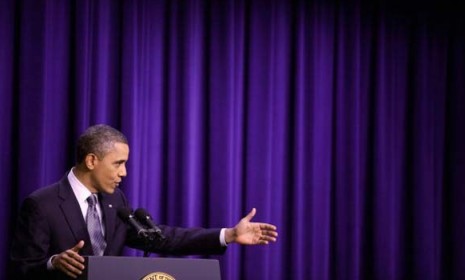Did Obama 'trap' Republicans on Social Security?
The president has been criticized for failing to cut entitlement spending in his new budget, says Glenn Thrush at Politico, but it may have been a smart political move

A free daily email with the biggest news stories of the day – and the best features from TheWeek.com
You are now subscribed
Your newsletter sign-up was successful
President Obama has taken plenty of heat from both the left and right for his proposed budget, says Glenn Thrush in Politico, largely because he shied away from tackling what even he agrees is "the country's major fiscal problem" — entitlement reform. But to Obama's fellow Democrats, "this omission was no sin. It was a gift." The way they see it, the president has set "a political trap" for Republicans, who are divided between a conservative bloc insisting on major changes to Medicare and Social Security, and "a GOP leadership wary of the political peril of tinkering with Americans’ retirement security." Here, an excerpt:
With Obama refusing to offer his own plan for entitlements, congressional Republicans — as the president noted — rushed in to fill the vacuum. ... Republican leaders have ruefully agreed to unveil their own list of "significant, not around-the-edges" reforms, according to a GOP aide.
"They are suckers," said one senior Democratic congressional aide of the House GOP plans to release the first detailed proposals to reduce entitlement spending. "They have painted themselves into a corner."
The Week
Escape your echo chamber. Get the facts behind the news, plus analysis from multiple perspectives.

Sign up for The Week's Free Newsletters
From our morning news briefing to a weekly Good News Newsletter, get the best of The Week delivered directly to your inbox.
From our morning news briefing to a weekly Good News Newsletter, get the best of The Week delivered directly to your inbox.
Under pressure from about 100 conservatives to tackle the issue — possibly through a new privatization plan that was part of the party’s midterm blueprint — the GOP leadership knows it is taking the first bite of a wormy political apple. “None of the options polls well,” lamented one Republican insider.
Read the full article at Politico.
A free daily email with the biggest news stories of the day – and the best features from TheWeek.com
-
 Why is the Trump administration talking about ‘Western civilization’?
Why is the Trump administration talking about ‘Western civilization’?Talking Points Rubio says Europe, US bonded by religion and ancestry
-
 Quentin Deranque: a student’s death energizes the French far right
Quentin Deranque: a student’s death energizes the French far rightIN THE SPOTLIGHT Reactions to the violent killing of an ultraconservative activist offer a glimpse at the culture wars roiling France ahead of next year’s elections
-
 Secured vs. unsecured loans: how do they differ and which is better?
Secured vs. unsecured loans: how do they differ and which is better?the explainer They are distinguished by the level of risk and the inclusion of collateral
-
 The billionaires’ wealth tax: a catastrophe for California?
The billionaires’ wealth tax: a catastrophe for California?Talking Point Peter Thiel and Larry Page preparing to change state residency
-
 Bari Weiss’ ‘60 Minutes’ scandal is about more than one report
Bari Weiss’ ‘60 Minutes’ scandal is about more than one reportIN THE SPOTLIGHT By blocking an approved segment on a controversial prison holding US deportees in El Salvador, the editor-in-chief of CBS News has become the main story
-
 Has Zohran Mamdani shown the Democrats how to win again?
Has Zohran Mamdani shown the Democrats how to win again?Today’s Big Question New York City mayoral election touted as victory for left-wing populists but moderate centrist wins elsewhere present more complex path for Democratic Party
-
 Millions turn out for anti-Trump ‘No Kings’ rallies
Millions turn out for anti-Trump ‘No Kings’ ralliesSpeed Read An estimated 7 million people participated, 2 million more than at the first ‘No Kings’ protest in June
-
 Ghislaine Maxwell: angling for a Trump pardon
Ghislaine Maxwell: angling for a Trump pardonTalking Point Convicted sex trafficker's testimony could shed new light on president's links to Jeffrey Epstein
-
 The last words and final moments of 40 presidents
The last words and final moments of 40 presidentsThe Explainer Some are eloquent quotes worthy of the holders of the highest office in the nation, and others... aren't
-
 The JFK files: the truth at last?
The JFK files: the truth at last?In The Spotlight More than 64,000 previously classified documents relating the 1963 assassination of John F. Kennedy have been released by the Trump administration
-
 'Seriously, not literally': how should the world take Donald Trump?
'Seriously, not literally': how should the world take Donald Trump?Today's big question White House rhetoric and reality look likely to become increasingly blurred